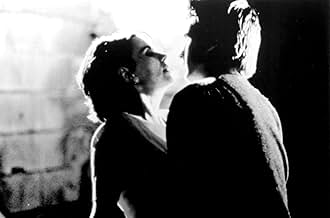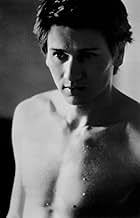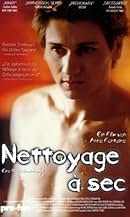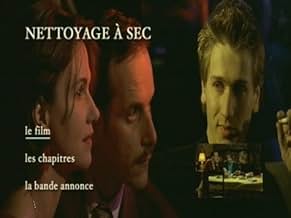Nettoyage à sec
- 1997
- Tous publics
- 1h 33m
IMDb RATING
6.7/10
1.2K
YOUR RATING
A bored couple takes in a young man who turns their lives inside out.A bored couple takes in a young man who turns their lives inside out.A bored couple takes in a young man who turns their lives inside out.
- Director
- Writers
- Stars
- Awards
- 3 wins & 6 nominations total
- Director
- Writers
- All cast & crew
- Production, box office & more at IMDbPro
Featured reviews
the idea is far to be now. the performances - decent. in fact, correct use of stereotype who was imposed by Teorema. the young seductive man. the wife remembering Madame Bovary. the husband on the top of solitude. provocative scenes and dialogues. not real surprising end. the only memory after few years after I saw it - the atmosphere. the ambiguous sexuality, the crisis of marriage and the last decision. and nothing more because the film is just occasion to intrigue, seduce and propose an idea who represents part of many couples fear.
10fps37
This story of a French couple, middle class business people leading a life that they only find boring when they encounter a young, free spirited and unisexual man, takes some weird turns but does it with excellent performances and direction. Though the ending was a bit abrupt, as well as shocking, getting there was the fun - well, pleasure, maybe. The young man has an affair with the woman, and is clearly drawn toward the man as while. The husband's reaction is the key to the drama, and the actor's subtle signs of being tempted, against his nature and resisting all the way , are truly fine acting. The whole cast is excellent, and the sensual , open tone of the movie, mixing the fairly straight-laced couple, their young child, middle class friends and family, and the worldly young man and depicting them, ultimately, as not really all that different, is almost comforting...until that ending, which came rather fast and furious after a more slow moving development, shattering the mood. Still, this is a really fine job of direction, and development of characters who all seem far more common than we would think if merely being told about them.
The mellow, mesmerising tune of the theme music by Edouard Dubois made me watch this movie twice while on a transcontinental flight. The music was only one reason among others that made me watch the film twice in four hours. I am a French film enthusiast and the contents of the film (latent homosexuality, guilt, cross dressing, etc.)were not out of the ordinary. What was striking in the film was the deliberate, structured screenplay that made me recall early works of Marcel Carne. I was not surprised to learn that the screenplay won an award at the prestigious Venice Film Festival and nominated for a Cesar in France.
The film's beginning and end revolve around affirmation of marital bonds, while the bulk of the film (to me only the sub-plot) ventures into transgression of those bonds followed by redemption. There is sadness at the end but it also accompanied by a silent studied reaffirmation of faith between man and wife. The final walk of the duo is an ordinary event yet captured powerfully in this film. I recommend this film to those who have not seen it not as a film that is extraordinary, but one which encourages viewers to introspect and look at ordinary lives, not of superheroes but of less than perfect men and women. The film succeeds because of low-keyed acting (Merhar and Miou-Miou), the sombre yet mesmerising music and good mise-en-scene. The film discusses "drycleaning" of two individuals' marital life, but the script and the director elevate the wife as strong personality with a level-headed strength developed quite unobtrusively as the film progresses. Anne Fontaine, the director, is someone to watch out for in the future as is Edouard Dubois. In more ways than one (direction, cinematography, the script) the film gives a woman's perspective of the story, though a wee bit sombre.
The film's beginning and end revolve around affirmation of marital bonds, while the bulk of the film (to me only the sub-plot) ventures into transgression of those bonds followed by redemption. There is sadness at the end but it also accompanied by a silent studied reaffirmation of faith between man and wife. The final walk of the duo is an ordinary event yet captured powerfully in this film. I recommend this film to those who have not seen it not as a film that is extraordinary, but one which encourages viewers to introspect and look at ordinary lives, not of superheroes but of less than perfect men and women. The film succeeds because of low-keyed acting (Merhar and Miou-Miou), the sombre yet mesmerising music and good mise-en-scene. The film discusses "drycleaning" of two individuals' marital life, but the script and the director elevate the wife as strong personality with a level-headed strength developed quite unobtrusively as the film progresses. Anne Fontaine, the director, is someone to watch out for in the future as is Edouard Dubois. In more ways than one (direction, cinematography, the script) the film gives a woman's perspective of the story, though a wee bit sombre.
To me, a romantically inclined gay man, this was a fascinating but ultimately unfulfilling tale of a `normal' French couple, Nicole and Jean-Marie Kunstler, who have grown unsatisfied with their settled, routine lives. The couple runs a dry cleaning business in an unexciting small French town. Their lives change when they go to a bar with some business associates and encounter Loïc and Marylin, a cross dressing brother/sister act. From the first, the couple is fascinated with the pair but particularly with Loïc, the sexually ambiguous brother, (played to perfection by Stanislas Merhar).
The couple is so enchanted with the pair that they take a weekend to the city where the performers are appearing next. When the sister decides to end the act and run away with her lover, the brother insinuates himself into the couples lives. The young man claims to be, and is by all indications, straight and soon takes the wife as a lover. The husband is also aroused by the boy but denies his attraction. Soon the boy is living in the couple's home and working in the Dry Cleaning shop and is showing a talent for that type of work. He even befriends the couple's child and helps him with homework and takes him skating.
Whether his good work arises from Loïc's desire to repay Jean-Marie or from some innate talent for dry cleaning is unclear. I think that Loïc feels guilty about cuckolding this man who has shown him nothing but kindness, genuinely likes the guy, and is aware of the man's attraction to him. He wants to make amends in any way that he can. Ultimately Loïc offers himself to Jean-Marie physically but is rebuffed.
Whether it's the husband's `homosexual panic' or his actually seeing his wife with Loïc during one of their trysts, Jean-Marie decides that Loïc must go. This leads to the final and I think dissatisfying concluding scenes.
The couple is so enchanted with the pair that they take a weekend to the city where the performers are appearing next. When the sister decides to end the act and run away with her lover, the brother insinuates himself into the couples lives. The young man claims to be, and is by all indications, straight and soon takes the wife as a lover. The husband is also aroused by the boy but denies his attraction. Soon the boy is living in the couple's home and working in the Dry Cleaning shop and is showing a talent for that type of work. He even befriends the couple's child and helps him with homework and takes him skating.
Whether his good work arises from Loïc's desire to repay Jean-Marie or from some innate talent for dry cleaning is unclear. I think that Loïc feels guilty about cuckolding this man who has shown him nothing but kindness, genuinely likes the guy, and is aware of the man's attraction to him. He wants to make amends in any way that he can. Ultimately Loïc offers himself to Jean-Marie physically but is rebuffed.
Whether it's the husband's `homosexual panic' or his actually seeing his wife with Loïc during one of their trysts, Jean-Marie decides that Loïc must go. This leads to the final and I think dissatisfying concluding scenes.
In a small town in France, Nicole Kunstler (Miou-Miou) and her husband Jean-Marie Kunstler is a traditional French middle-class couple, bored with their years of marriage and running a small business of cleaning and ironing clothes with some financial difficulties. When they meet the bisexual Loic (Stanislas Merhar) working as drag in a night-club with his sister Marylin (Mathilde Seigner), the sexually dissatisfied Nicole feels a great sexual attraction for him. The couple brings the young man to live and work with them, in a weird relationship, and Nicole has an affair with Loic and becomes a happy person. This intriguing triangle of love has a tragic end. "Nettoyage à Sec" is almost an excellent romance. The screenplay begins very daring, but the solution for the love situation is very moralist and resolved in a tragic, but easy way. The cast has a great performance and the direction is very good, but the story deserved a better conclusion. My vote is seven.
Title (Brazil): "Lavagem a Seco" ("Dry Cleaning")
Title (Brazil): "Lavagem a Seco" ("Dry Cleaning")
Did you know
- SoundtracksTexas Rocker
Written by Alan Darby
- How long is Dry Cleaning?Powered by Alexa
Details
Box office
- Gross US & Canada
- $14,919
- Opening weekend US & Canada
- $14,919
- Feb 7, 1999
- Gross worldwide
- $14,919
- Runtime
- 1h 33m(93 min)
- Color
- Aspect ratio
- 1.66 : 1
Contribute to this page
Suggest an edit or add missing content


























